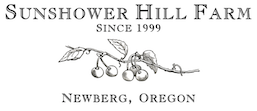Sunshower Hill Farm is a 9-acre diversified family farm located on the eastern edge of Yamhill County. The farm was purchased in 1999 from members of the Schaad family, who owned the farm for 44 years and whose family homesteaded much of Rex Hill (also known as Parrett Mountain). Once a 40 acre parcel, former blackcap, cherry, plum and walnut production, the farm is now home to 20 Stella (black) cherry trees, laying hens, fall-bearing Anne and Caroline raspberries and an annual row crop production that sells farm direct and local wholesale vegetables and herbs. Over the years the family production has also included heritage pork, beef and walnuts. In 2012, two value added products were added: culinary wood chips and dried herbal loose-leaf tea. We engage in farm practices that are organic and sustainable.
Ranee Solmonsson was raised in Newberg on a 13-acre family farm and has lived in Newberg for 22 years. She strives for a grounded and healthy lifestyle of farm-raised products and minimizing her food miles and footprint by raising and eating local, made-from-scratch food in her farm kitchen. She now wears multiple hats, teaching, running the family farm and renovating historic Yamhill county houses as part of a different business.
Jody Solmonsson is a construction engineer by trade. His building and planning background from all phases of commercial and civil construction bring an important set of skills to the family business growth model in creating plans for expanded production and infrastructure.
Sunshower Hill Farm has had a small production operation since 1999. During the course of operation, many different diversified products have been under production. The original purpose of the farm was to provide for our own family’s local food needs, while also supplementing with some direct farm sales.
The market focus of the farm is for wholesale and restaurant customers in the local area, with direct farm sales for special events.
There is a lot of momentum behind the local food movement and we are thankful that we have been connected to the happenings.
Stewardship & Farming Practices
Our Farm is located near the base of Parrett Mountain, just east of Newberg near the edge of Yamhill County. The 9 acres contain a variety of sloping terrains, including a southeastern facing seasonal stream that feeds to Chehalem Creek. In 2000, as part of our conservation plan, Douglas Fir seedlings were planted along the north and southeastern borders of the property. This provides a natural buffer zone and creates habitat that fits into our master plan of incorporating a food forest into our production plans.
As our “5 Mile Food” policy, we usually do not delivery or ship farther than a 5-mile radius of the farm and never distribute farther out than Carlton, Oregon. This us allows us to keep down our costs, create custom and flexible deliveries and keep our community food miles low and maintain local food systems for everyone’s health.
Soil Tilth
As part of our stewardship program, we conduct regular soil nutrient tests and supplement with organic minerals and amendments needed to work on building soil fertility naturally to boost production. All compostable byproducts and manure generated on our farm are added back into the nutrient recycling program. We use only mechanical weed control (mulch and cover cropping), never any sprays. Our soil management practices also include no-till and minimal till systems in order to promote biodiversity and soil health.
Our production plans are based on responsive farming, meaning that we grow crops that are symbiotic to our local soils, micro-climates and conditions. If we notice that certain crops do not integrate well into this system, they are eliminated after a trial basis and replaced. We are in the constant process of evaluation of new and unique specialty vegetables and small fruits to continually improve our lineup of offerings.
We also enjoy relationships with both a local horse facility as a source of manure and our coffee ground recycling partnership with a local coffee retailer.
Polyculture: using multiple crops in the same space, imitating the diversity of nature. This includes intercropping, companion planting, crop rotation,
Special Projects
In the early spring of 2016, our farm was awarded a grant through the Oregon Watershed Bureau and the Yamhill County Soil and Water Conservation District. The purpose is to improve soil fertility, nutrient recycling and farm for beneficial insects, as well as prevent soil erosion and enhance stream habitat.
Purpose: Improve production and profitability through improved soil fertility, recycling of nutrients and attract beneficial insects as part of our natural integrated pest management.
Stream (flows from east side of property diagonally to south side property line)
· Plant native species along stream banks for erosion control
· Install rock bed for erosion control along stream banks
· Remove invasive species
· Complete technical analysis, reconfiguration and repair of damaged and outdated tiling system
Manure Management and Nutrient Recycling
· Consolidate manure composting systems from 4 locations into one area to allow for more efficient compost finishing and prevent runoff/nutrient loss of composting materials.
· Expand coffee ground collection and composting to create custom manure/coffee ground recycling system for use on farm.
· Reconfigure high use areas around barn slopes to reduce erosion impact.
· Complete construction of mobile layer unit to reduce feed loss and predator impacts
Erosion Control and Farmscaping
· Establish complete cover crop plan for both high use and production areas
· Continue voluntary participation in City of Newberg’s Trees for Streams program (2 years of participation completed)
· Plant and maintain riparian buffer along southeast corner with Old Parrett Mountain Road in order to attract beneficial predator insects, create a wind break and add to erosion control
· Complete farmscaping plan along all production area borders
· Plant native species along south and east slopes (bare soil)




